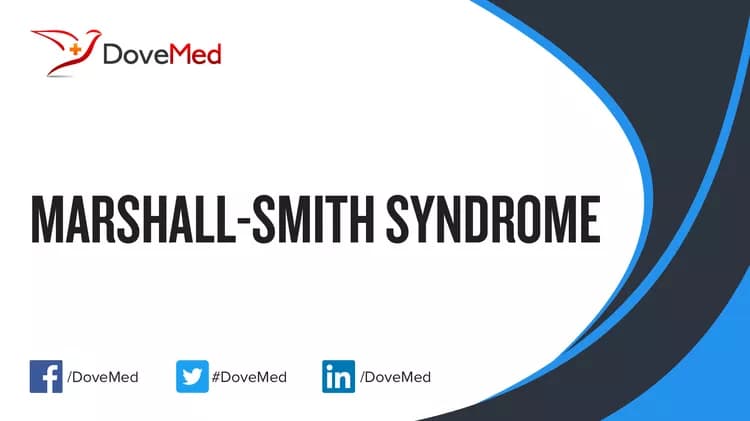What are the other Names for this Condition? (Also known as/Synonyms)
- Accelerated Skeletal Maturation-Facial Dysmorphism-Failure to Thrive Syndrome
- MRSHSS (Marshall-Smith Syndrome)
What is Marshall-Smith Syndrome? (Definition/Background Information)
- Marshall-Smith Syndrome (MRSHSS) is a genetic disorder in which individuals typically have advanced bone age, difficulties gaining weight (failure to thrive), unique facial features, and intellectual disability
- Other signs and symptoms of this condition may include eye abnormalities, breathing difficulties, and neurological issues. Individuals may also have heart defects, an increased amount of body hair (hirsutism), and flat feet (pes planus)
- MRSHSS is caused by mutations in the NFIX gene. Most individuals with MRSHSS are the first in their family with this condition and are said to have a spontaneous (de novo) mutation
- Although there is no specific treatment or cure for MRSHSS, there may be ways to manage the symptoms
- A team of doctors is often needed to figure out the treatment options based on each person’s symptoms. Aggressive management of the early breathing and feeding problems may improve survival in individuals affected by this condition
(Source: Marshall-Smith Syndrome; Genetic and Rare Diseases Information Center (GARD) of National Center for Advancing Translational Sciences (NCATS), USA.)
Who gets Marshall-Smith Syndrome? (Age and Sex Distribution)
- Marshall-Smith Syndrome is an extremely rare congenital disorder. Approximately, 30 cases have been reported in the medical literature
- The presentation of symptoms may occur at birth or in infancy
- Both males and females may be affected
- Worldwide, individuals of all racial and ethnic groups may be affected
What are the Risk Factors for Marshall-Smith Syndrome? (Predisposing Factors)
- Currently, no risk factors have been clearly identified for Marshall-Smith Syndrome
It is important to note that having a risk factor does not mean that one will get the condition. A risk factor increases one’s chances of getting a condition compared to an individual without the risk factors. Some risk factors are more important than others.
Also, not having a risk factor does not mean that an individual will not get the condition. It is always important to discuss the effect of risk factors with your healthcare provider.
What are the Causes of Marshall-Smith Syndrome? (Etiology)
- Marshall-Smith Syndrome is caused by mutation(s) in NFIX gene
- In most cases, the causative NFIX gene mutation(s) are sporadic in nature and not inherited from parents
What are the Signs and Symptoms of Marshall-Smith Syndrome?
The major signs and symptoms of Marshall-Smith Syndrome may vary in type and severity among affected individuals, and may include:
- Severe breathing difficulties
- Accelerated skeletal maturation
- Failure to thrive
- Distinctive facial features, such as a wide and prominent forehead, protruding and widely spaced eyes, a depressed nasal bridge, a small upturned nose, and a small jaw (micrognathia)
- Intellectual disability
- Developmental delay
Other common signs and symptoms of this disorder are:
- A blue tint to the whites of the eyes (blue sclera)
- An abnormal curve in the spine (scoliosis and kyphosis)
- Loss of tissue in the gums
- Heart defects, such as a hole in the heart between the different chambers (septal defects)
- Protrusion of part of the intestines through the umbilical opening in the abdominal muscles (umbilical hernia)
- An abnormal amount of hair growth over the body (hirsutism)
- Hearing loss
- Low muscle tone (hypotonia)
- Enlarged ventricles in the brain (ventriculomegaly)
- An abnormal number of folds in the brain (pachygyria or polymicrogyria)
- Septo-optic dysplasia (a condition caused by underdevelopment of the optic nerves and structures along the midline of the brain)
- Seizures
(Source: Marshall-Smith Syndrome; Genetic and Rare Diseases Information Center (GARD) of National Center for Advancing Translational Sciences (NCATS), USA.)
How is Marshall-Smith Syndrome Diagnosed?
Marshall-Smith Syndrome is diagnosed on the basis of the following information:
- Complete physical examination
- Thorough medical history evaluation
- Assessment of signs and symptoms
- Laboratory tests
- Imaging studies
- Biopsy studies, if necessary
- Molecular genetic testing to check for or confirm causative NFIX gene mutation(s)
Many clinical conditions may have similar signs and symptoms. Your healthcare provider may perform additional tests to rule out other clinical conditions to arrive at a definitive diagnosis.
What are the possible Complications of Marshall-Smith Syndrome?
The complications of Marshall-Smith Syndrome may include:
- Aspiration pneumonia
- Fractures without any physical trauma
- Severe intellectual deficiency
Complications may occur with or without treatment, and in some cases, due to treatment also.
How is Marshall-Smith Syndrome Treated?
There is no cure for Marshall-Smith Syndrome, since it is a genetic condition. The treatment is usually given to manage the signs and symptoms and any complication that develops.
How can Marshall-Smith Syndrome be Prevented?
Currently, Marshall-Smith Syndrome may not be preventable, since it is a genetic disorder.
- Genetic testing and prenatal diagnosis (molecular testing of the fetus during pregnancy) may help in understanding the risks better during pregnancy
- Active research is currently being performed to explore the possibilities for treatment and prevention of inherited and acquired genetic disorders
Regular medical screening at periodic intervals with tests and physical examinations are recommended.
What is the Prognosis of Marshall-Smith Syndrome? (Outcomes/Resolutions)
- The prognosis of Marshall-Smith Syndrome is poor in most cases, owing to severe breathing problems and associated complications. The condition is fatal in most cases, with affected children succumbing to the disorder within the first few years of life
- In rare cases without respiratory distress, or with the respiratory problems aggressively treated, affected individuals have been known to survive beyond childhood. However, intellectual deficiency may still be present
- Typically, the prognosis may be assessed on a case-by-case basis
Additional and Relevant Useful Information for Marshall-Smith Syndrome:
The following DoveMed website link is a useful resource for additional information:
Related Articles
Test Your Knowledge
Asked by users
Related Centers
Related Specialties
Related Physicians
Related Procedures
Related Resources
Join DoveHubs
and connect with fellow professionals


0 Comments
Please log in to post a comment.